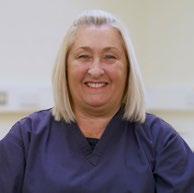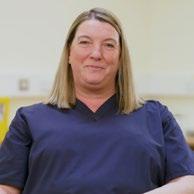Which NHS service? When?
Self-care
Conditions that will get better themselves over time: Headaches, coughs, colds, grazes, sore throats.
You can look after yourself at home. Ensure you have a well stocked medicine cabinet.
Pharmacy
Conditions that are helped by medicines: Diarrhoea, painful coughs, medicine advice.
Pharmacy teams are experts in medicines who can help you. They all have consultation rooms if you’d prefer to talk in private.
GP practice
Longer lasting illnesses:
Vomiting, aches and pains, fever in children, ear infections.
Your GP practice offers a range of healthcare professionals including doctors and nurses who are available for all health concerns and can refer to other medical services when required.
NHS 111
Unwell and unsure where to go?
Advice on more urgent medical conditions.
111.nhs.uk online or over the phone can help if you have an urgent medical problem and you’re not sure what to do. They can even book an appointment to some health services if needed.
Mental health support
Wellbeing helpline: 0800 915 4640 or text 'hello' to 07860 022 846.
In crisis and need support straight away, call 0800 953 0110.
Urgent Treatment Centres
For conditions that are more urgent but not life threatening: Cuts, sprains, minor burns and fractures.
You can go to these centres if you need more urgent medical attention that’s not life threatening. Most can even x-ray.
A&E or 999
Severe bleeding, severe chest pains, strokes, breathing difficulties, loss of consciousness
Emergency departments or A&E are only for life threatening emergencies. You may have to wait as more serious conditions are dealt with first.
If you require your dentist in an emergency or out of normal opening hours, call them as they will have answer machine messages detailing where to access out of hours service. If you have a dental emergency, but aren’t registered with a dentist, call the dental helpline 0300 1243 010 or use NHS 111.
Find your nearest pharmacy here: nhs.uk/service-search/pharmacy/find-a-pharmacy
Find your nearest Urgent Treatment Centre or Minor Injury Unit here: nhs.uk/service-search
Right person… right care
Reception staff undertake training to signpost you to the correct service. Going directly to the most appropriate professional will reduce the number of appointments you need, meaning you’ll get seen quicker. You will still be offered an appointment with your GP if this is most appropriate for you.
Your local GP practice is offering evening and weekend appointments at the surgery or at an NHS service nearby.
Speak to the reception team when you book or visit your GP practice’s website for more details.

Receptionist





Vaccinations
The flu virus can change every year.
This means that the flu (and the vaccine) may differ each year.
If you had the flu vaccine last year, then it’s important that you have it again this year.
The COVID and flu vaccines can be given on the same day and some people might get both at the same time. However, this may not always be possible, so we encourage you to get each vaccine as soon as you can.
Health facts
There
are lots of different health messages out there.
Get HEALTH-WiSE as we put the story straight with these health facts.
Buying over-the-counter medicines from a supermarket is often much cheaper and means no waiting for your GP to prescribe or your pharmacy to dispense.
X-rays are available at Urgent Treatment Centres (UTCs). You will be treated for fractures or have them ruled out. If you have a serious injury that needs treatment, the UTC can assess you, and will refer you to A&E or a Fracture Clinic, if needed.
The NHS recommends that if you are pregnant, you should have both the flu and COVID-19 vaccine to protect both you and your unborn baby. It’s safe to have either vaccine at any stage of pregnancy, from the first few weeks up to your expected due date.
Antibiotics are not an effective treatment for winter symptoms such as a cough, cold, sore throat, flu or nasal congestion. These symptoms are caused by viruses and antibiotics only work on certain infections caused by bacteria.
A&E sees the sickest people first. You could face a long wait if there are people with more serious conditions. You may also be sent elsewhere that’s more suitable to help you.
If you no longer need your appointment at your GP practice you should always call to cancel as it can be used to treat another patient who is waiting. Tens of thousands of appointments are wasted each month in Lancashire and South Cumbria. This means over 1,000 people every day don’t get seen as quickly as they would have liked or needed.
If you need a prescription for a condition you’ve had for a while and have been prescribed medication for it before then you do not need to see a GP first. There are lots of ways to order a repeat prescription that don’t involve seeing a GP.
Self care
Self care is about keeping fit and healthy, understanding when you can look after yourself, when a community pharmacy can help, and when to get advice from your GP practice or another health professional.
Most of the common ailments are self-limiting. That means they will get better themselves over time. Here’s some advice on some common winter ailments and how you can use home remedies and over the counter medicines to speed recovery.
Cough
Expect to last: 3 weeks
Home remedies:
Freshly squeezed juice from one lemon and a teaspoon of honey to a mug of hot water.
Medicines:
Cough mixtures and lozenges can help loosen phlegm or ease pain caused by coughing. Paracetamol is also recommended. Seek medical advice if:
> you cough up blood
> the cough lasts longer than 3-4 weeks
> you also have chest pains
> you find it difficult to breathe
> you notice swelling in your neck or above the collarbones
Colds
Expect to last: 1-2 weeks
Home remedies:
Sadly, there is no cure for the common cold. The best thing to do is get plenty of rest, eat healthily and drink plenty of fluids. Warm drinks often help.
Medicines:
There are a range of cold and flu medicines available and most of them tackle some of the symptoms such as congestion or headaches. Paracetamol or ibuprofen do the same thing.
Seek medical advice if:
> you have a high temperature above 38C
> you begin to feel confused or disorientated
> you have sharp pains in your chest
> you cough up blood
> you have difficulty breathing
> you have swelling in your neck
> your symptoms last longer than 3 weeks
Sore throat
Expect to last: 3-7 days
Home remedies:
Drink plenty of fluids. Eat cool, soft foods, suck on lozenges or hard sweets. Gargling with warm salty water may also help reduce swelling and pain.
Medicines:
Painkillers help to relieve symptoms. Use what suits you best and talk to your pharmacy if you’re unsure.
Seek medical advice if:
> you have a high temperature over 38C for more than 3 days
> you find it difficult to breathe
> you notice swelling in your neck or above the collarbones
> you find it difficult to drink enough fluids
Headache
Tension headaches affect both sides of the head. They usually feel ‘pressing’ or ‘tightening’ and can be caused by stress, tiredness, dehydration and loud noises. Migraine symptoms can vary but often affect one or both sides of the head and are made worse by ordinary daily activities.
Expect to last: 24 hours
Home remedies:
Try to relax and get plenty of sleep. Drink plenty of fluids. Avoid alcohol and caffeine. Eat regular meals.
Medicines:
Paracetamol or ibuprofen can help. Seek advice from your pharmacy. Seek medical advice if:
> your headaches become more frequent
> you vomit for no apparent reason
> you have a high fever
> you develop a stiff neck
> you have had a blow to the head
> you cannot sleep
> your headache is worse on coughing, straining or bending
> you notice a change in your speech or personality
> you develop weakness or numbness anywhere on your body
> your eyes feel uncomfortable when looking at bright lights
> you have muscle pains
Sinusitis (blocked nose)
Expect to last: 2-3 weeks
Home remedies:
Rest. Breathe the steam from a bowl of hot water with menthol in. Apply a warm face pack (you can use a face cloth) and then wash o ut the nose with a stream of saline solution (available from a pharmacy). Drink plenty of fluids.
Medicines:
Paracetamol or ibuprofen can help reduce your symptoms. Vapour rubs can help babies and young people.
Seek medical advice if:
> you have a high temperature above 38C
> you begin to feel confused or disorientated
> you’re at high risk of complications because you have other pre-existing medical conditions
> you suffer pain or discomfort in your face
> your nose produces lots of thick green/yellow fluid
Heartburn and indigestion
Indigestion (dyspepsia) is a general term for pain or discomfort felt in the stomach and under the ribs.
Heartburn is when acid moves up from the stomach into the gullet (oesophagus) and causes a burning pain behind your breastbone.
Expect to last: Usually very short-term but could last 1-2 weeks.
Home remedies:
Avoid fatty or fried meals or eating large meals late in the day. Avoid fizzy drinks, coffee and alcohol. When in bed, prop your head and shoulders up with a couple of pillows.
Medicines:
There are medicines you can buy called antacids that can help neutralise the acid in your stomach.
Seek medical advice if:
> you suffer from severe, persistent (longer than three weeks), worsening and unexplained pain in your upper abdomen – particularly if occurring together with other symptoms, such as pain in your chest, breathlessness, sweating, feeling sick or vomiting
> you vomit blood or dark lumps (like ‘coffee grounds’)
> you feel faint, or you’ve collapsed
> you develop difficulties with swallowing
> you suffer from unexplained fever, night sweats, weight loss, or you notice a swelling or mass in your upper abdomen
Sprains and strains
Typical symptoms of a sprain include pain around a joint, swelling, tenderness, and an inability to use the joint normally.
Expect to last: 6-8 weeks
Home remedies:
Avoid exercising the limb for 72 hours. Use ice to help swelling. Compression bandages can protect the limb and help with swelling. Keep the limb elevated.
Medicines: Painkillers.
Seek medical advice if:
> you suspect the limb is broken
> you can’t walk
> the body part is deformed or shows lumps
> the skin over the area feels numb
> you notice more than only mild bruising or swelling (go to an Urgent Treatment Centre or Minor Injuries Unit)
> your pain doesn’t improve after 3-4 days
Keeping well in winter
The
cold weather puts a lot of people at risk of being unwell or having an accident. Stay HEALTH-WiSE by knowing what to do.
Preventing falls
There are many reasons why you could be more at risk of falls so taking daily steps to reduce this is recommended for all ages.
These are exercises you can do at home to help prevent falls.
1 Heel raises - raising up onto your toes slowly, holding onto a counter or back of a chair for support.
2 Toe raises – as above but moving back on to your heels and lifting your toes.
3 Leg raises – lifting one leg up by bending and raising the knee.
4 Walking heel to toe – walking in a straight line bringing the heel of your front foot to the toe of your other foot.
5 Sitting and standing –strengthen leg muscles by sitting down and standing up again without using your hands, keeping your legs together.
Aim for 150 minutes of moderate exercise with a mixture of strength and balance work spread out across each week. We have videos showing all these exercises in seven languages at healthierlsc.co.uk/NHShealthwise under 'Self care'.
Long-term conditions
Winter can make some long-term conditions worse. Here are some of the best ways to be ready.
Manage your health condition (speak with your nurse if you have one).
Stock your medicine cabinet with painkillers, antihistamines, cough and cold lozenges, bandages and plasters. Get the COVID-19 and flu vaccinations.
Looking after yourself
This pyramid shows the relative energy use of these appliances. Oven, kettle, electric hob
Stay active if you can.
Order repeat prescriptions in time so you don’t run out over bank holidays.
Keep warm – heat your home to 18-21°C when you can or have warm meals or drinks.
Depending on your respiratory condition and the type of inhaler you use, you may need to take your inhaler for preventative reasons as well as a relief when you need it. Prevention inhalers should be taken as directed by your nurse as this will help stop you from getting ill. Speak with your respiratory nurse for advice.
Vacuum cleaner, microwave, toaster, dishwasher
Washing machine, slow cooker, TV, fridge, light bulbs
The oven, kettle and electric hob use the most energy, so you might want to keep an eye on how much you use them. A slow cooker uses the least energy to cook a warm meal. A lightbulb uses the least, and costs less than a penny per hour to run.
Mental health
There are many situations in people’s lives that have a huge impact on mental health and not everyone feels comfortable asking for help.
Why not reach out for a chat with a friend, family member or one of your neighbours?
They may also appreciate an offer to help with their food shopping or collecting medicines if they can’t easily get out of the house.
If you want to improve your health and wellbeing there is lots of help and support available to you: healthierlsc.co.uk/NHShealthwise and select 'Mental health'.
Social prescribing link workers are also available through your GP practice.
Contacts and sources of more information
There are a range of services that can offer advice to help you over winter and during the cost-of-living crisis.
NHS Lancashire and South Cumbria: healthierlsc.co.uk/NHShealthwise
Blackburn with Darwen Council: blackburn.gov.uk/cost-living-support/household-support-scheme
Blackpool Council: blackpool.gov.uk/Residents/Advice-and-support/ Financial-advice/Cost-of-living-help.aspx
Central Government: helpforhouseholds.campaign.gov.uk/
Cumbria County Council: cumbria.gov.uk/costofliving/
Lancashire County Council: lancashire.gov.uk/health-and-social-care/cost-of-living/
